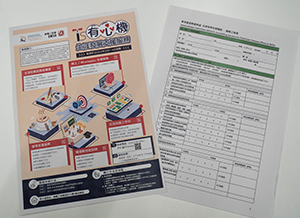CS Voice:Counselling Services for Technician Trainees
EMSD Stationed Social Workers Helps Youth Career Life Development

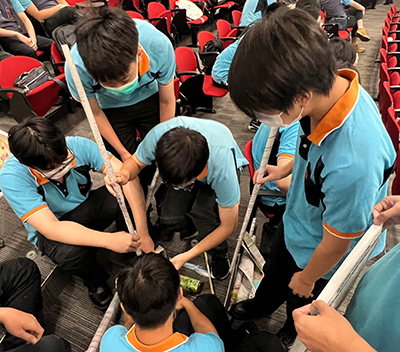
'In the past, I just winged it, not knowing what my future looks like,' said 23-year-old Tse Yuk Hei, Howard, 'now, I look at the sky, I can see far and beyond, and understand different developmental opportunities.’ About three years ago, Howard joined the Technician Training Scheme of the Electrical and Mechanical Services Department (EMSD). Because of his introverted personality, he had problems communicating with his colleagues. It was then that he came across 'Hong Kong Christian Service - Counselling Services for Technician Trainees' (The project) run by our North Point Happy Teens Club (NPHTC)…
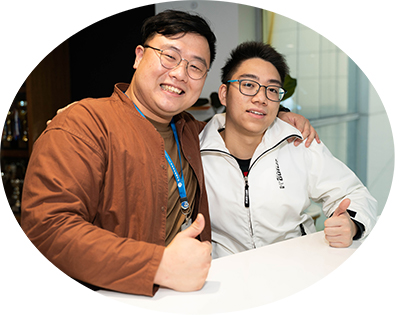
Social Worker - Tony(Left) & Howard (Rigth)
Helping young people overcome career confusion
Before joining EMSD, Howard worked as a programme assistant, an IT support officer and a property management officer. 'At the time, I didn't know what my future held. I just took it one step at a time, working in jobs that suited me. If I felt it was not a good fit, I left immediately,' he said. At the same time, he tried to work while studying for a bachelor's degree, but it was too stressful to sacrifice his social life and hobbies. He later joined the EMSD and although he felt more grounded, like other young people, he occasionally had disagreements with his colleagues. 'I don't know how to express myself and I don't ask questions immediately if I don't understand, which can lead to misunderstandings about the content of the work,' he recalled, 'at the time I felt very low and every time I thought about it I got a headache.'
In February last year, the project was launched, bringing opportunities for Howard's career life development. In the beginning stages of receiving counselling, Kan Ying Tung, Tony, the social worker of NPHTC, realised that Howard was treating his job with a student's mindset, 'he was always sitting down in silence behaving, hoping that mentors will actively teach him, as the teachers at school did.' After counselling from social workers, Howard could take charge of his personality and characteristics, find his work values, and develop communication methods that suited him, no longer simply pursuing 'high pay and short hours'. He also learnt note-taking skills to record his daily life and work experience, developed a sense of responsibility, actively participated in different activities, and developed hobbies. More importantly, he became a 'worker', able to take responsibility actively and anticipating a future working in the STEM field. He finally regained the esteem from his supervisor and co-workers.
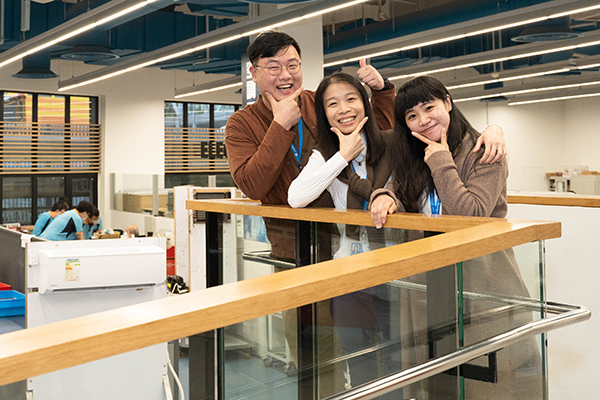 (From Left to rigth) Tony , Eva & Trista
(From Left to rigth) Tony , Eva & Trista
'The support of the social workers has given me a lot of confidence, like a rope that allows me, a frog trapped in a well, to jump out of the well,' Howard said. Yuen Tsz Ling, Eva, the Service Supervisor of NPHTC, added, 'this rope is not magic and won't automatically pull you up to the sky. The most important thing is that you are willing to climb out yourself.'
Co-creating new services for whole person development
As the first Apprentice Training Scheme with stationed social workers in Hong Kong, the project supports about 700 EMSD apprentices. 'Our apprentices are mostly young people, many of whom are confused about their careers. We hope to cultivate them to follow a good path in the future and have a sense of responsibility to society, so we designed and launched this innovative youth career life development service,' said Tang Kai Wing, Chief Technical Officer at EMSD, explaining the genesis of the project. Mr Tang, also a former apprentice, had unsatisfactory school results and used to work as a taxi driver, a clerk and a courier, etc., similar to Howard's experience. 'I couldn't find a job either and was always confused and worried about the future. So today I hope to help young people to plan their future clearly and to contribute and take responsibility for society.'
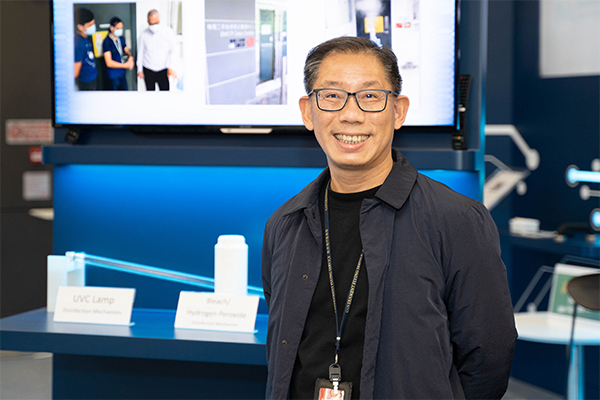
Mr. Tang Kai Wing, Chief Technical Officer of EMSD
'We share a mutual value with EMSD, which is the importance put in the whole person development of youths,' said Eva, 'an apprentice may realise that they are not suited for electromechanical work. We believe the most important thing is strengthening their self-awareness and understanding their weaknesses and interested paths. Then, they can embark upon their goals and, most importantly, not be taken over by the feeling of being lost.' Based on this mutual value, the social welfare sector and EMSD work together to 'co-create' this new service. She added, 'EMSD views overall career and life development with utmost importance. They are actively participating in the process, and we listened to many opinions from our co-workers and mentors at EMSD, which helped us improve and evolve our services.'
Currently, the project mainly provides support in three areas, including apprentice career life development consultation, emotional support for apprentices, and EMSD mentor training. Mr Tang mentioned the recent 'Partnership with TTs' workshop', which used Marvel Comics characters to introduce Holland Code for workplace personality, helping the mentors understand the personality and thoughts of youths nowadays. 'Every apprentice has different traits, and without these workshops, we might not have understood the thinking of our young apprentices.' Mr Tang said, 'our profession is about practical skills. Social workers can focus on the apprentices' attitude and mindset development, which is vital in balancing us.'
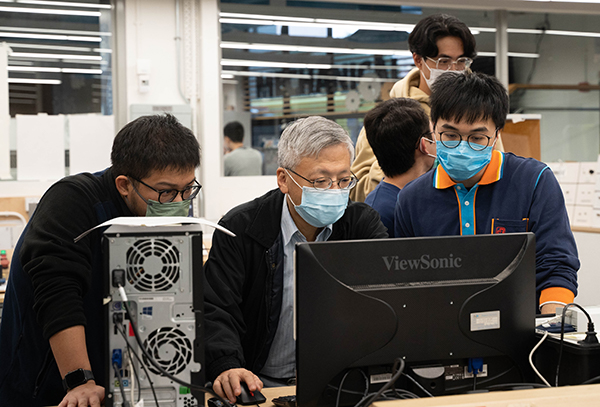
Filling service gap for youth development
For Mr Tang, the project has benefited not only the trainees but also the mentors. 'Everyone involved in the service has grown, it can be described as lifelong learning,’ he said with a smile. The 'masters' at EMSD speak from the heart and sometimes do not have the most effective communication with the apprentices. With the support of social workers and various workshop training sessions, their communication with colleagues and family members can be improved. 'With the social workers as a bridge, the mentors understand that the world is constantly changing and there is more tolerance for the team. The atmosphere in the department is also more positive.'
Wong Sze Man, Trista, the Social Work Assistant of NPHTC, gave an example. One apprentice was often late for work, and even after the mentor pointed out the problem, there was not much improvement. 'We use various tools to understand why the apprentice tends to be late, and we found out that he originally used electronic games to relieve stress,' Trista said, 'we are like a bridge, helping mentors and apprentices break through the traditional framework of superior and subordinate relationships, thereby strengthening communication between the two parties and making the work more effective.'
In an ordinary workplace, employees have to deal with problems in their career life development by themselves, which is precisely the service gap the project has filled. Tony pointed out, 'there are a lot of apprenticeship programmes in different organisations in Hong Kong. These "employed youths" have just left secondary school and the normative social welfare services. They are changing their identity. There are a lot of difficulties that may arise with that, and they may need social workers to support them.'
'I hope that this service can serve as a demonstration and that more corporations will follow suit,' Eva said, looking to the future, 'we firmly believe that as long as the bridges between schools, colleges, and communities are built well, many youth problems can be solved.'
